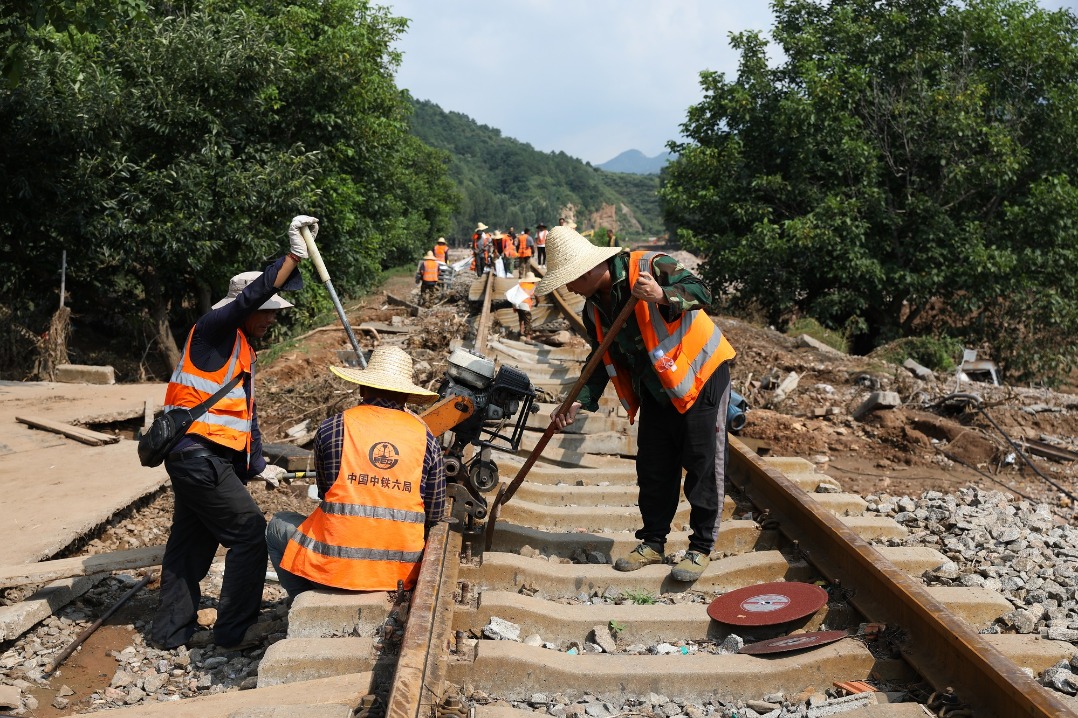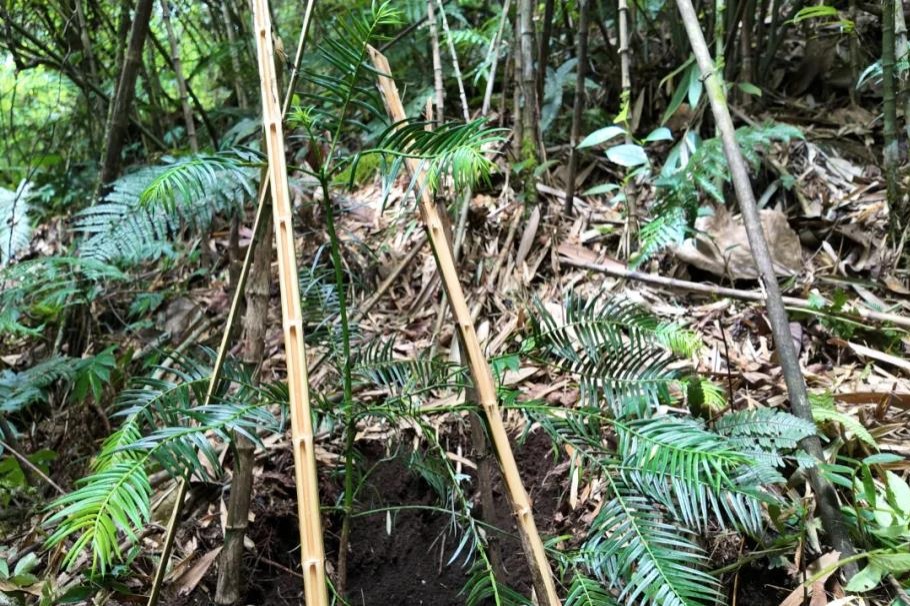On the health front line
Universities boost research with specialized schools set up across the country, Wang Qian reports.

Universities are on the front line in bolstering public health education and research as the novel coronavirus outbreak has been effectively controlled in China.
According to the World Health Organization, public health is defined as the "science of preventing disease, prolonging life and promoting health through organized measures of society". Its activities focus on entire populations, not just on individual patients or diseases, and aim to provide conditions in which people can be healthy. It should be considered a first line of defense under the principle of the three "P's"-personal pandemic preparation.
Universities, including Tsinghua University, Beijing University of Chinese Medicine, Fudan University and Southern University of Science and Technology, are among those stepping up.
On April 2, Tsinghua University's Vanke School of Public Health was set up in Beijing to boost training, scientific research and governance capacities in public health management. Margaret Chan, former WHO director-general, was appointed as the inaugural dean.
"The COVID-19 pandemic is a disaster on a global scale... Facing such a grave challenge that concerns the future of mankind, universities must shoulder our due responsibilities," Tsinghua President Qiu Yong said at the inauguration ceremony in Beijing, adding that universities should take up responsibility in organizing research to fight against the virus.
The same day, Southern University of Science and Technology in Shenzhen, Guangdong province, announced a cooperation plan with the local health commission and the Shenzhen Center for Disease Control and Prevention to build a School of Public Health and Emergency Management.
Beijing University of Chinese Medicine has confirmed that it is evaluating a project to build a public health school exploring the benefits of Chinese medicine in public health.
Fudan University in Shanghai is also preparing to build a public health emergency management center, which will highlight interdisciplinary research, Wu Fan, vice-president of Shanghai Medical College of Fudan University, told Jiefang Daily recently.
However, facing the deadly pandemic, surging cases and casualties across the world indicate that no country is fully prepared in its public health system. As of April 13, COVID-19 has infected more than 1.77 million people, claiming over 111,000 lives globally, according to WHO data. The number is still climbing.
Findings from the Global Health Security Index, an October report from the Nuclear Threat Initiative, the Johns Hopkins Center for Health Security and the Economist Intelligence Unit, echoed that "national capacity in the areas most relevant to preventing, detecting and responding to global catastrophic risks is generally weak".
The report said that countries must embrace a "One Health" approach, in which multiple sectors communicate and work together to achieve better results, as part of pandemic planning and national disaster preparedness and response efforts.
Colleges taking action
The good news for China is that colleges are taking the lead in strengthening the country's public health research and expertise.
With a donation of its 200 million shares valued at 5.3 billion yuan ($752 million) to support the school's development from Shenzhen property developer Vanke, the recently established Tsinghua Vanke School of Public Health will enroll postgraduate students in four research fields-preventative medicine, comprehensive healthcare, big data in healthcare and public health policy and management, according to Gong Peng, head of the school's preparatory expert group.
"With preventative medicine as the basis, the other three fields are the key healthcare trends to watch in the 21st century," Gong says.
Comprehensive healthcare is in line with the Healthy China 2030 Initiative to boost public livelihood and longevity. Big data in healthcare will empower healthcare with the application of big data and artificial intelligence, while public health policy and management is urgently needed in dealing with epidemic outbreaks, Gong explains.
The school aims to provide support for the country's epidemic control, vaccine development and decisive think tanks related to major public health policymaking in the coming five to 10 years.
"It will be a world-class school," Gong says, adding that there will be various cooperation with the WHO in healthcare expertise exchange, medical technology development and research.
WHO Director-General Tedros Adhanom Ghebreyesus also looks forward to "future collaboration" between the two organizations to keep the world safe through research and by strengthening health and preparedness systems, according to his video message congratulating the school's establishment.
"The disease has made us better understand the importance of international cooperation and building a community of a shared future for humankind. The school is a rising star in the night of this pandemic," Chan said at the inauguration ceremony.
Besides Tsinghua University, Fudan University's public health emergency management center is in the preparatory stage, which is included in Shanghai's 14th Five-Year Plan (2021-25). By 2024, the center is set to become a WHO's regional public health emergency management center.
As traditional Chinese medicine has been playing a critical role in the prevention, treatment and rehabilitation of COVID-19, Beijing University of Chinese Medicine is also exploring ways of combining Chinese remedies and Western medicine in public health education.
Suggestions
Many experts warn that the COVID-19 outbreak has exposed weakness in the country's public health system, such as talent shortages and the slow pace of technology adoption.
"We should use the next five to 10 years to invest hundreds of billions of yuan in building and improving a state-level public health and epidemic prevention and control system to avoid destructive contagions, such as SARS and COVID-19," according to a signed article by Huang Qifan, vice-chairman of the China Center for International Economic Exchanges, on news outlet Yicai.
He suggested that the Ministry of Education should encourage universities, not limited to medical schools, to establish high-quality public health schools to nurture professionals who have expertise in public health, epidemic prevention and emergency response.
Statistics showed that about 80 universities of the total 3,000 have set up public health majors, from which 7,000 students graduate every year.
In 2003, the country's first batch of 22 colleges began to enroll students for public health master programs.
A study released in the Chinese Journal of Preventive Medicine last year showed that the size and the enrollment scale of the country's students in public health with a master's degree were relatively small, and the practical skills and emergency response courses are far from enough, lagging behind the pace of social development. The study, under the authorship of Ren Tao from Peking University's School of Public Health, surveyed students in public health with a master's degree.
Huang suggested establishing a state-level independent public health university, similar to National Institutes of Health in the United States. "The degree of civilization in a society can be judged by the infrastructure provided to its citizens," Huang said, adding that it is time to invest in healthcare and epidemic prevention sectors.
According to the latest statistics of the Ministry of Finance, the central government spent nearly 1.7 trillion yuan on healthcare last year, taking about 7 percent of the total public budget.
Jing Jun, public health professor with Tsinghua University, says that one lesson that we should learn from the COVID-19 outbreak is the importance of epidemic preparedness.
"Authorities should be prepared in epidemic surveillance, medical systems, medical human resources and facilities for the next outbreak," Jing says, adding that the diseases to be highlighted should consider the WHO's list of top 10 emerging diseases likely to cause major epidemics, including MERS and SARS coronavirus diseases, Crimean-Congo hemorrhagic fever, Ebola, Marburg, Lassa fever, Nipah and Rift Valley fever.
He suggests that authorities should let multiple parties, such as research institutes and companies, get involved in the epidemic surveillance sector to make the health information more transparent.

Today's Top News
- Xi stresses key role of public opinion
- War-themed movies teach important lessons
- Xi urges studying, absorbing netizens' opinions in formulating 15th Five-Year Plan
- Yuan eyes greater role among safe-haven assets
- China set to clean up online health content
- China, EU can shape climate governance






























